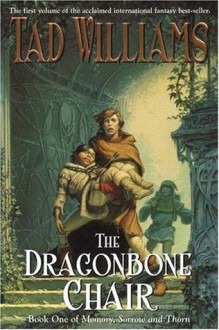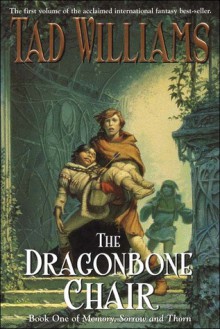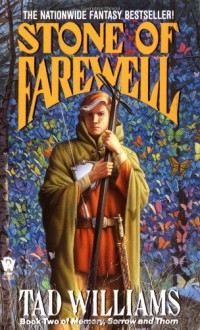
A classic in the fantasy field, this is best suited for readers looking for the traditional orphan-identity quest. While I enjoyed it overall, I was able to set the book down and walk away, coming and going from the story until Simon reached the woods. I consider it a bad sign when I'm able to set a book down--my favorites have me locked into reading position until I reach the end page. Eventually it picked up and reeled me in, but there was skimming involved. A combination coming-of-age and castle/kingdom political novel, I felt like the book would have benefited more from focusing on one or the other. As it was, the politics were mostly the side story, and I largely skimmed over those sections of the book without any real decrease in enjoyment of Simon's story. It's classic high fantasy, with full landscapes and world building, starting from the castle to underground tunnels to a deep forest, to a deserted Sithi (read elven) city, a highlands castle and a mountain. When the book ends with Simon and other adventurers sent on a journey for a missing sword, it's almost shocking that it's not a ring. I like that Williams' world contains non-human races. There is the most interesting take on trolls that I've read yet--Binobik and his wolf quickly became my favorite characters. The white hounds and the Bakken bring nicely frightening elements to the story.One frustration is that Simon's development seemed very uneven and unlikely to me, that parts of his political and intellectual consciousness seemed so limited even when being taught by the doctor. He does indeed behave like a fourteen year old boy at the beginning of the story, and credit to Williams for capturing that well enough to be annoying. Every time you turn around, he's complaining about reading, and his refrain lasts for some time even into his forest journey. However, rescuing the Prince should have been the beginning of a political awakening . We very much get the "boy buffeted about by the winds of fortune" storyline, but he remains clueless every step of the way. Then suddenly he develops a sense of honor towards his kidnappers--that almost results in repeated injury by the Bakken. This was the Simon who had no honor towards shirking workloads in the castle, and who discovered a monk had fleeced him--twice--and has resolved to guard himself more closely? It's that kind of uneven characterization that makes him frustrating to root for as a lead, being so malleable and of almost no strong principles. I did like that he was open-minded enough to befriend a small person.I didn't find the writing particularly impressive or beautiful, and it is odd to have bold and italicized words. The song lyrics are often distracting, but occasionally add some richness to the story. It feels like it was trying hard to be capital "E" epic, and the cliffhanger ending is an annoyance. I'll grab the next one from the library.


 Log in with Facebook
Log in with Facebook 







